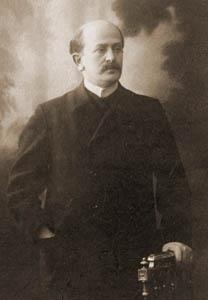| This article includes a list of references, related reading, or external links, but its sources remain unclear because it lacks inline citations. Please help improve this article by introducing more precise citations. (October 2018) (Learn how and when to remove this message) |
| This article relies largely or entirely on a single source. Relevant discussion may be found on the talk page. Please help improve this article by introducing citations to additional sources. Find sources: "Alexander Braudo" – news · newspapers · books · scholar · JSTOR (October 2018) |

Alexander Braudo (Russian: Александр Исаевич Браудо; Aleksandr Isaevich Braudo; 1864 in Vilkomir, Kovno Governorate – 1924 in London) was a Russian-Lithuanian-British Jewish author and publisher.
From 1889 until 1892 he was reviewer of literature on Russian history for the Jahresbericht der Geschichtswissenschaft and the Istoricheskoye Obozrenie, published by the University of St. Petersburg; he translated sources for Russian history, as Grevenbruch's Tragoedia Moscovitica, 1606 (history of the false Dmitri); and Neuville's Relation Curieuse, 1689 (history of the riot of the Streltsy). He wrote a number of articles in Russki Bibliograficheski Slovar, published by the Historical Society of the University of St. Petersburg, and a series of reviews in the Zhurnal Ministerstva Narodnavo Prosvyeshcheniya.
In the Voskhod for 1896 there appeared his reviews of the works of Bershadski on the history of the Jews. While secretary of the Society for the Promotion of Education Among the Jews of Russia, he succeeded in directing the activity of that organization toward the encouragement and development of elementary education among the Jews. He was member of the advisory board of the Jewish Colonization Association.
References
 This article incorporates text from a publication now in the public domain: Herman Rosenthal & S. Janovsky (1901–1906). "Alexander Braudo". In Singer, Isidore; et al. (eds.). The Jewish Encyclopedia. New York: Funk & Wagnalls.
This article incorporates text from a publication now in the public domain: Herman Rosenthal & S. Janovsky (1901–1906). "Alexander Braudo". In Singer, Isidore; et al. (eds.). The Jewish Encyclopedia. New York: Funk & Wagnalls.
This article about a Russian writer or poet is a stub. You can help Misplaced Pages by expanding it. |